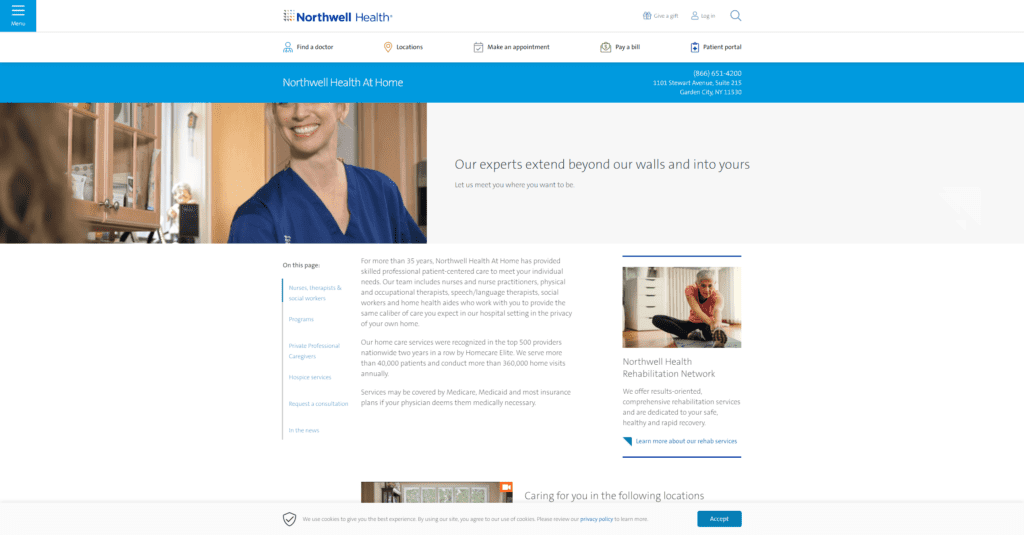This article is part of the Tommy Cat Media quick-fire series, which discusses key marketing concepts and applications tailored to specific industries in under 800 words.
Acquiring new customers is always a difficult task. That task is much more difficult when starting in the home healthcare industry.
Home healthcare is utilized mostly by older Americans. In 2015-16, a staggering 81.9% of all people requiring home healthcare were over the age of 65.
Marketing to this age demographic needs near-perfect branding to foster a trusting relationship between the service provider and the client.
This article discusses ways to make your brand more trustworthy to attract the home healthcare audience.
The Number One Factor in Home Healthcare Marketing is Brand Trust.

Companies and marketing affiliates are wrong when they think they can launch a home healthcare brand and find success right away. Success is defined as providing the service or creating a proxy site to generate leads.
According to a 2020 report on consumer trust,67% of survey responders trust healthcare brands. 1 out of 4 people is overly cautious about healthcare decisions made online.
Everyone wants the best for their health. People do not trust just any website that provides information or medical services. That is why brands like WebMD, Mayoclinic, and Medline Plus have a solid foothold in the medical information category.
A new website posting medical information has no chance of competing with industry leaders until they build a brand that people can trust.
Home Healthcare Brands Need Functional Websites Built Around Security.
The best way to create consumer trust in the home healthcare industry is to create a secure, legit-looking website.
Use an SSL Certificate

A best practice across all websites handling sensitive information (like a home health care website) is using an HTTPS encrypted connection, also known as an SSL certificate.
The HTTPS connection between your website and servers is necessary because the information sent between your website and the server will be in plain text and susceptible to hacks if left unprotected.
Without an SSL certificate, people land on the website and receive a security prompt alerting them that security will be at risk.
That is a terrible look for a healthcare brand.
Accurate information is a must for Marketing with Home Health Care Brand
Healthcare falls under Google’s YMYL content guidelines
The home healthcare industry falls under what Google calls YMYL (Your Money or Your Life) category. That means that Google is much more strict concerning ranking websites that promote content that has the potential to affect an individual’s health or financial status.
When creating content for the home healthcare industry, your information needs to be current and accurate. You should cite your sources and link to them in your articles. The source needs to be credible as well.
If you consistently post quality content, your domain authority will increase.
As your domain authority increases, Google will rank your website higher, potentially bringing more customers to your website.
Social Proof is key for people to build trust with Home Healthcare Brands

The best way to garner consumer trust from your audience in the home healthcare space is to include social proof on your website.
Social proof is when people vouch for your brand and share their positive experiences. They can come in several ways like video testimonials, Google reviews, Yelp Reviews, Better Business Bureau rankings, etc.
If you choose to include social proof on your website, it can ease customers’ fears of inquiring about poor service. They can also trust your brand with their sensitive information or more importantly, their health.
Including social proof is a great signal to search engines that your brand is legit. This tactic will help your brand rank higher on the SERPS and more customers find your brand.
Conclusion
The home healthcare industry is dominated by an audience that is already skeptical about being on the internet.
With 1 of 4 people not trusting healthcare brands, it is very important that your brand’s internal presence creates an experience built around security and proof that your brand is legit and able to carry out home healthcare tasks.
About the Author
Andrew McMenamy
A natural problem solver with 6 + years of marketing experience building audiences across numerous verticals. Specialties include content, email, and performance marketing. Andrew graduated from Dowling College with a Bachelor’s in Business Administration in Marketing Management. Follow me on Linkedin and Quora.
